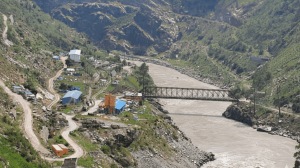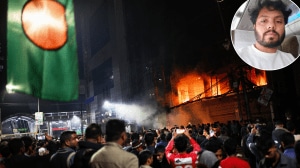
What has the Opposition achieved by bringing a no-confidence motion?
What the Opposition has achieved is a discussion on Manipur that the government was not prepared to countenance. The Opposition members in the Lok Sabha and the Rajya Sabha had been giving adjournment motions and suspension of business notices from the day the session commenced, essentially demanding a discussion on Manipur that still continues to be in turmoil. The government was not willing to entertain the adjournment motion. Had they accepted it, the minister concerned or the administrative minister would have replied … but the government chose not to accept it. Therefore, the Opposition was left with no other option but to bring a no-confidence motion to force a discussion on the security situation in Manipur.
The way the discussion has panned out, it is not confined to Manipur alone. While the Treasury Benches are talking about the government’s achievements, the Opposition members are trying to corner the government on a variety of issues. Manipur is just one of the talking points.
Obviously, because once a no-confidence motion is tabled then everything gets discussed. It is a fair game. So, the government talks about achievements and the Opposition will bring into focus all the failures of the government over the past nine years because we are heading into an election in eight months. So, once you have a no-confidence motion that was the logical trajectory.
In addition to Manipur, the most serious challenge this country faces is the continuing transgression by China across the Line of Actual Control for 37 months running now. There are very serious questions that I asked in the House during the motion of no-confidence and we do hope that the government addresses those questions rather than sweeping them under the carpet.
The no-confidence motion was to force the Prime Minister to come to Parliament and reply to the motion. But he was not present in the House on Tuesday and Wednesday.
It is unfortunate that all parliamentary propriety, traditions, and conventions are being thrown to the wind. According to the “Practice and Procedure of Parliament” by M N Kaul and S L Shakdher, it is very clear that when a no-confidence motion is accepted by the presiding officer, that should be the first order of business. But here the 10 days that have been given in the rules of procedure were given a very expensive interpretation to allow the normal legislative business of the government to go ahead at a point in time when there was a pending accepted motion of no confidence against the government in the House. It raises questions about the legality of those Bills that have been passed in both Houses when there was a motion for want of confidence that was pending.
Presuming, hypothetically, even if the government can get the confidence of the House, what will be the constitutional status of the Bills passed in the interregnum? That is, when the no-confidence motion is accepted by the Speaker of the Lok Sabha and when the House finally votes on the motion of confidence or a motion of no confidence is a Constitutional grey area that will have to be adjudicated in an appropriate case by a court of law.
In so far as the prime minister is concerned, all parliamentary propriety has unfortunately been given a complete pass. If you look at past no-confidence motions, Prime Ministers have sat through the entire discussion and heard every speaker because the wording of the motion very clearly says that it expresses want of confidence in the Council of Ministers and as the first minister, or as the Prime minister, it is incumbent upon the leader of the government to listen to those people who have brought about this no-confidence motion.
Story continues below this ad
Right from the PM to senior BJP leaders, the ruling side has been attacking the INDIA alliance. It was called ‘ghamandiya (arrogant)’ … The PM talks about ‘Quit India’ — that corruption, dynasty and all should quit India.
Something seems to be working since the government is unnerved. To mount a laser-focused and vituperatively bitter attack on the Opposition … I was personally very disappointed by the personal attacks. On Tuesday, we saw, especially from the Treasury Benches, there were very very acerbic attacks against the Opposition. Ideally, any debate or discussion on any issue, especially a no-confidence motion, in the highest legislative temple of the land should be on issues and not personalities. Unfortunately, from the Treasury Benches, we have seen very vicious and personal attacks that lower the decorum of both the House and the discourse. What I was able to observe is that there is a strange diffidence from the Treasury Benches on addressing the core issue of this no confidence, which is the situation in Manipur.
Rahul Gandhi in his speech took on the BJP over the situation in Manipur. Many of the other Congress leaders too tried to counter the BJP on the nationalism plank. You mentioned the Chinese intrusion.
The situation in Manipur should disturb every sensitive human being. From May 3 to August 9, the situation has been continuing to be incendiary. Therefore, if the government does not act here to contain the situation and control the violence, it has severe strategic and national security implications in addition to the continuing damage to the social fabric of Manipur.
The Congress vociferously opposed the NCT Bill in both Houses. The state units of the Congress in Delhi and Punjab and unhappy with the growing closeness between the AAP and the Congress at the national level.
The NCT Bill was not about the AAP. The NCT Bill was about the manner in which the Union wants to have a relationship with the states. It is about mutilating the Constitutional design that is predicated on the fundamental principle of federalism. So, under those circumstances, if there is an attempt to subvert the basic design of the Constitution, it will be opposed for the simple reason that if this could happen to Delhi what is the guarantee tomorrow that the Union will not legislate to try and get legislative powers with regard to the State List and the Seventh Schedule? So, eventually, if you were to read what happened in Delhi and then what happened in J&K four years earlier there is a pattern. And the pattern is very clear. That there is an increasing propensity towards centralism because in the case of J&K, if you read Article 3 closely, it does not provide, in any manner, the conversion of the state into two Union Territories.
That matter is currently being heard in the Supreme Court but the fact is that if you take J&K in juxtaposition with what happened in Delhi, this capacity towards centralism will subvert the entire Constitutional design.
Story continues below this ad
You are from Punjab. Your party is fighting the AAP tooth and nail. In West Bengal, the TMC and the Congress are pitted against each other. In Kerala, it is the Left and the Congress. How do you see seat-sharing happening between parties of the INDIA alliance given the state-level differences?
We will cross the bridge when we come to it. The fact is that as of today the INDIA alliance seems to have held together fairly well.
The NDA has 38 constituents now. Many of those parties represent smaller caste and community groups. Do you see the BJP playing the caste card well?
The NDA has been comatose for the last four years. Probably, when the second meeting of the INDIA alliance was held in Bengaluru, it was resurrected like an aberration and it seems to have again been packed off in some dark political closet because it has served its limited purpose of trying to counter the headline of the day.

































